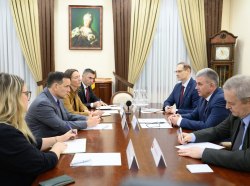Tiraspol, 15 July. /Novosti Pridnestrovya/. The railway delivery of imported goods was discussed at the Bavarian conference, which took place on 12−13 June in Bad Reichenhall, Germany, the acting foreign minister of the PMR, Vitaly Ignatyev, said during a briefing on the conference results.
«We principally focused on the problem of railway communications. We had touched upon that issue during Berlin's 'Permanent conference…' meeting, detailed our concerns in a debate at the level of the chiefs of delegations, as well as during a closed door discussion during the conference," said Vitaliy Ignatyev.
«The acuteness of the problem brings forward its economic and humanitarian implications. It became known during the Bavarian conference that more imported cargoes, and excisable goods in particular, imported by our economic agents had been stopped," said the foreign minister.
Back in 2012, Pridnestrovian President Yevgeny Shevchuk and Moldova's then prime minister Vladimir Filat signed a protocol agreement on the renewal of full-fledged railway communications through Pridnestrovie, thanks to which Pridnestrovian enterprises managed to export their goods directly through the Ukrainian border rather than through Moldova as before.
In December 2015 Moldovan and Ukrainian authorities changed the procedure of railway deliveries without consulting with Pridnestrovie. As a result, the Pridnestrovian railway was in fact excluded from the scheme of importing cargoes to the republic. These operations are now performed by exclusively Moldovan railway engines.
This decision led to considerable losses incurred by GUKP Pridnestrovian Railway, totalling over 5 million roubles only in the first quarter of 2016.
This decision was further aggravated by a ban on the importation of excisable goods through the Slobodka Export railway station, Pridnestrovie's MFA reported on 12 July.
«Together with our Ukrainian colleagues we have to find a prompt solution to the problems arisen because of the detention of the cargoes imported by Pridnestrovian economic agents. Over these two days we have managed to partially resolve the problem — one part of cargoes left on 12 July, another on 13 July," said the minister.
Vitaliy Ignatyev also noted that the further blockade of railway communications might lead to unpredictable results. The diplomat added that this problem must be resolved as soon as possible as the protocol decision on railway communications expires in 2016. Moldova and Pridnestrovie will have to determine whether to extend it or work out a new agreement.
Vitaliy Ignatyev underscored, in the meantime, that the principles underlying the present protocol were quite acceptable and guaranteed the interests of both Pridnestrovie and other participants of the railway communications.
«In fact, this is a classic example of a win-win decision, which as distinct from a zero sum decision benefits all participants," said the acting minister.








